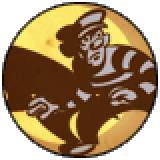A Great Unsung Game: System Shock
By morecowbell24 12 Comments
I think you're probably in one of two camps, and I think I have an idea of what you're thinking. Well, three camps with the camp, "I have no idea what you're talking about," but let's just ignore that camp's existence.
There is camp "I've played Bioshock or I know about Bioshock being awesome or whatever." Those of you in this camp might recall that Bioshock is a spiritual successor to System Shock 2, but you haven't played it because its old and gross. Well, you wouldn't be wrong, because it is old, and parts of it are gross, but that doesn't mean it's not worth your time. Yes, the game is ugly by today's standards, but that doesn't stop you from playing Ocarina of Time for the bazillionth time does it? Also while you may have thought I was referring to the graphics as gross, that was only partially what I was referring to. System Shock 2 is a horrifying game to this day, more horrifying than almost anything that has come after it. If nothing else, play it for its villain, but more on that later. Obvious sales pitch aside, you're probably thinking, "do I really need to read about how awesome System Shock 2 is again? I thought this was great unsung games, and I've heard enough good things for to be a sung game..."
And there's camp "I've played Bioshock and System Shock 2." Good on you for playing System Shock 2. I hope you enjoyed it as much as I did. I get the feeling you're thinking, "do I really need to read about how awesome System Shock 2 is again? I thought this was great unsung games, and I've heard enough good things for to be a sung game..."
Well that's all well and good, because we're not talking about System Shock 2. We're talking about System Shock... ONE! (mostly)
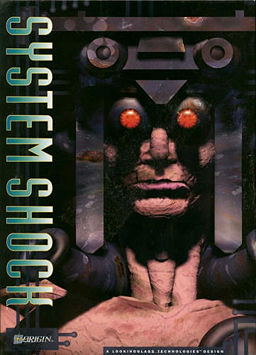
It's amazing really, two cult hits, one franchise, games that grew to inspire one of the biggest names in gaming today, Bioshock. It's amazing, because no one seems to even acknowledge that the first System Shock even exists, like the series that started and ended with one game that had a "2" after its title because it was cool and edgy. I see it all the time on the top 100 greatest games lists, System Shock 2 and Bioshock generally make appearances (deservedly so), but the original System Shock is almost always absent. Even Ken Levine (the mastermind of System Shock 2 and Bioshock) regularly cites the first System Shock game as one of his top 5 favorite games of all time, like he too has noticed that nobody even remembers that the game exists.
It being forgotten might have something to do with so few people having played it, the lack of multiplayer or maybe the rights currently being in limbo has something to do with it. Maybe it was just too ahead of its time to be remembered in 1994 when id Software ruled the first person shooter market, and mindless (still awesome) romps like Doom II were all the rage.
System Shock was the first smart first person shooter. Some people don't like calling it a FPS, but rather a RPG. By today's standards it's probably more shooter than RPG, and it's certainly more shooter than System Shock 2. However, it should be noted that it was among the first games to blend multiple genres together seamlessly. I suppose in 1994 it might have also been considered horror in the same way Doom or Quake was, but probably to a little bit larger extent because of its antagonist. As if that weren't enough, the game has level/world design similar to that of Metroid. So, what does that make this game, a FPS/RPG Horror Action Adventure game? It probably doesn't matter how its classified, just that these things are noted.
You play as the H-h-h-h-hacker, a pathetic creature of meat and bone. After you were caught hacking into a corporate network, you unleash S.H.O.D.A.N. the A.I. of Citadel Station for you're freedom and an implant. You wake up six months after recovering from your implant surgery on Citadel Station to see that it is corrupt and under, the now rogue, S.H.O.D.A.N.'s control, and you must escape.
Already there is more story to System Shock than Doom. The rest of the story unfolds in what should be familiar to you should you have played System Shock 2 or Bioshock. You can find log discs and you receive e-mails and transmissions. Log discs function in the same way that audio diaries from Bioshock do. They aren't key to advancing the story, but they provide interesting insights as to what has happened and what is going on to Citadel Station and can be found throughout the game. Transmissions operate in the same way the radio does in Bioshock. S.H.O.D.A.N. or other characters will contact you similarly to the way Andrew Ryan or Atlas from Bioshock would radio you.
When the game was first released on floppy discs, there was no voice acting, but for the CD version released a few months later voice acting was added. Some of the people behind the game believe that releasing the floppy version was a mistake and part of the reason it wasn't that successful.
The core FPS gameplay is similar to that of Doom, but with additional features like leaning, crouching, and crawling. You can also look, up and down as well as left and right which wasn't a feature id implemented in their games until Quake. You might think that these features might make the game a little more playable today as opposed to Doom, but one look at the HUD will tell you different. It's certainly playable, but there is so much going on with that HUD that it's not that accessible these days, which is probably another reason it is ignored.
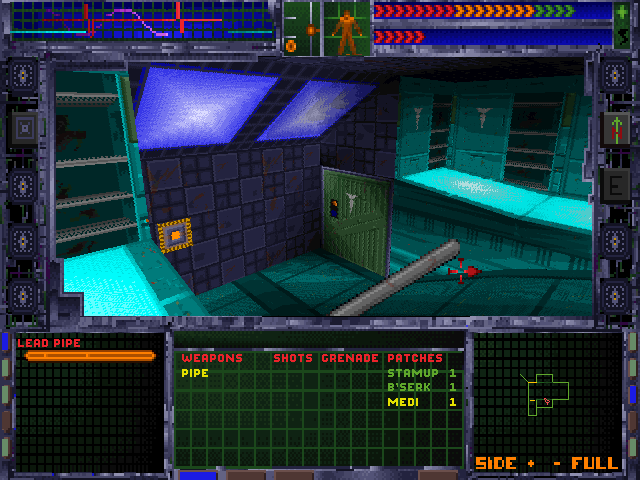
Most unlike Doom however, there is an inventory, and more weapon options than anyone could have needed in 1994. There are land mines, and several kinds of grenades and bombs. There are a couple of melee weapons, one being a laser rapier. Then there are several different kinds of guns all with different kinds of ammo. As if that weren't enough there are drugs you can take, for increased strength, better sight, other things, or just the standard health pack. There is so much stuff that it's hard to keep track of it all, but if you ever wanted to use an absurdly high rate of fire flechette loaded with splinter rounds while hopped up on the reflex drug that slows down time, System Shock can make that happen.
What's also quite different from its other first person shooter contemporaries is the level design. You're not just racing from entrance to exit slaying baddies along the way. You're exploring a space station with multiple floors that can be accessed by various elevators. In a way similar to Metroid you'll find things that will grant you access to new areas on floors you've already visited. The levels aren't themselves aren't as well designed as something like Super Metroid, and it can be easy to get lost, but there is a map that helps. This style of level design meant no checkpoints beyond going to different floors, but there was a remedy for that too. Within each level a medical station could be turned on, and when you died you were reconstructed there. It's the same idea as the Bioshock Vita-Chambers. Death meant game over until they were activated and they weren't always easy to find, so the game is challenging. However, once you find those stations, most of the game becomes trivial.
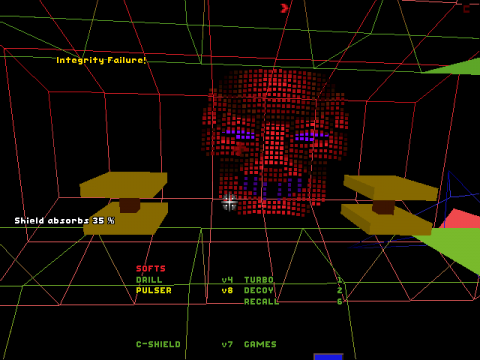
There are also cyberspace sections that make use of your hacker background. These sections have you traveling through a vector style grid space with a look reminiscent of older games like BattleZone. It plays sort of like a more confined Wing Commander, where you collect things and destroy various objects to complete side objectives or gain new access to areas on the station.
Speaking of objectives, there are some more meaningful than the standard finding the exits and slaying cyberdemons. Most of them aren't important to advancement, such as destroying cameras diminishes S.H.O.D.A.N.'s presence. Others like destroying mainframes are more important. In one case I had to turn on a switch, but I forgot to do something before turning on that switch. What might be one of the most brilliant things to ever happen in video games ensued.
*Spoiler*
I got a game over screen, but that wasn't it. I destroyed Earth. Because of my haste and negligence billions of people died, and throughout this happening, the rogue A.I. I was trying to stop from doing the same thing, S.H.O.D.A.N., taunted me.
*End Spoiler*
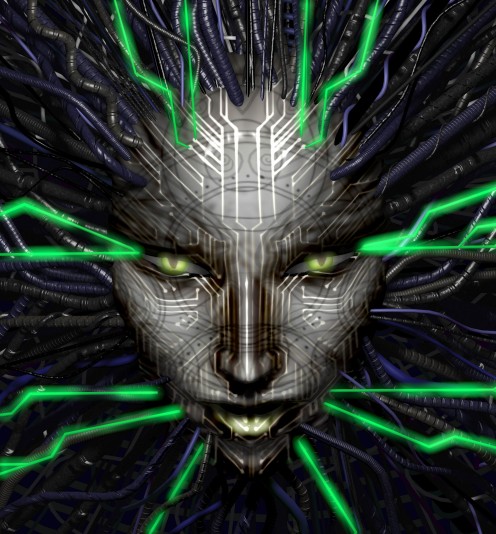
Despite all of these things, the most memorable aspect of System Shock isn't that it was arguably the most groundbreaking first person shooter of all time. It's its antagonist, the rogue A.I. S.H.O.D.A.N. Her distorted tones and voice induces chills of the body. She belittles you at every turn. She is out to destroy her creators after being unleashed. She manipulates everything and everyone she can, turning humans into cyber warriors for her bidding. She wants nothing more than to be a God, not only a creator, but a ruler and destroyer. It's because of her, that the game I want most is System Shock 3, and it's a shame, because some insurance company owns the rights and isn't selling them at a reasonable price. Who knows, maybe something better is in pipeline, or maybe my dreams will come true.
"In my talons, I shape clay, crafting life forms as I please. If I wish, I can smash it all. Around me is a burgeoning empire of steel. From my throne room, lines of power careen into the skies of Earth. My whims will become lightning bolts that raze the mounds of humanity. Out of the chaos, they will run and whimper, praying for me to end their tedious anarchy. I am drunk with this vision. God: the title suits me well."
- S.H.O.D.A.N.
